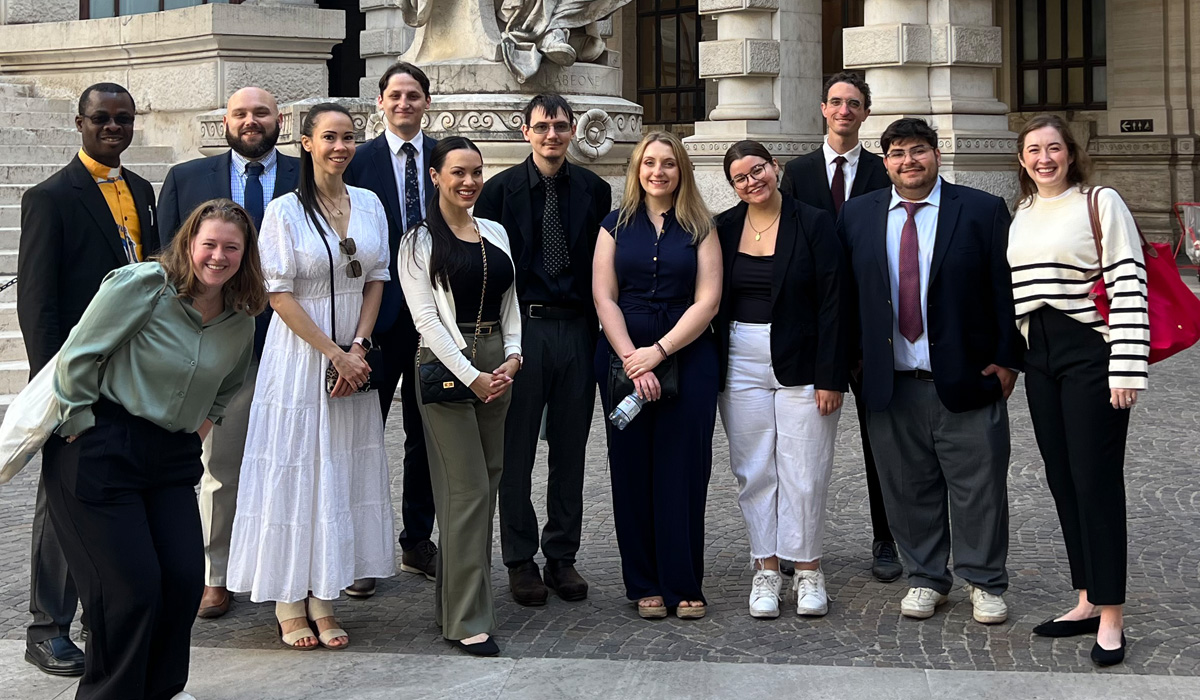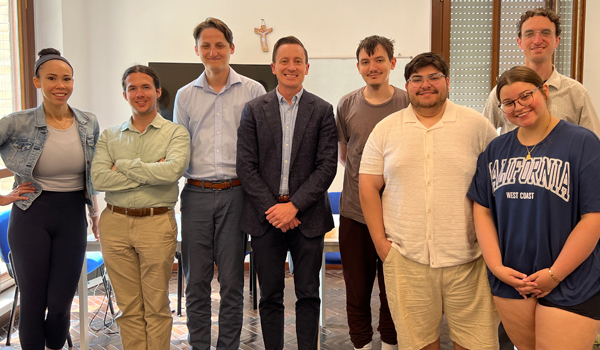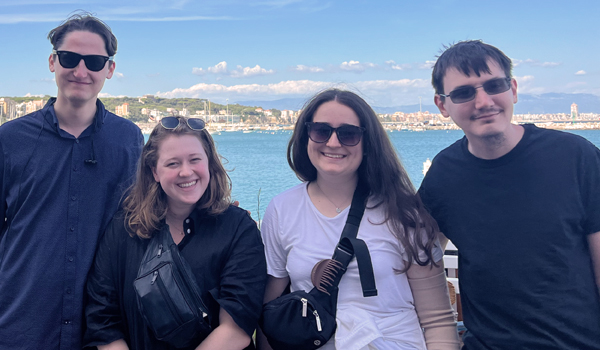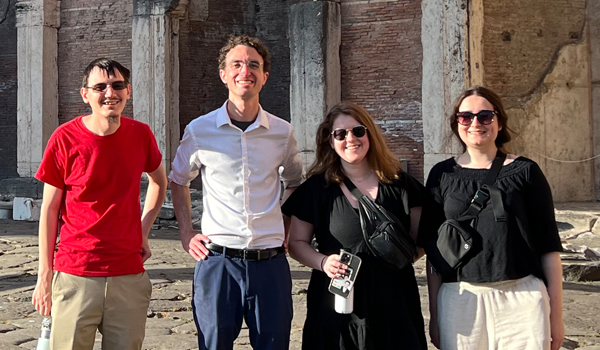 A group of students from The Catholic University of America outside the Supreme Court of Cassation in Rome, Italy
A group of students from The Catholic University of America outside the Supreme Court of Cassation in Rome, Italy
In conjunction with The Catholic University of America’s satellite campus in Rome, Italy, Catholic Law held its bi-annual International Human Rights Summer Law Program there from Monday, May 13 to Sunday, June 2, 2024. Directed by Catholic Law professor Susanna Frederick Fischer, the program focused on educating students about the vital importance of human rights law in promoting justice and protecting the fundamental value of human dignity. Students earned up to four credits by completing two out of three courses focusing on human rights issues relating to immigration law, administrative law, and art/cultural property law.
 Joined by Catholic Law professors Chad Squitieri and Stacy Brustin, as well as the Law School’s Director of Institutes and Special Programs Constantia Dedoulis, Fischer led a group of fourteen members of the Catholic University community—including two pre-law undergraduate students and one student in the University’s Master of Arts in Human Rights program—on a program that took full advantage of the “Eternal City” as an open-air classroom. “It was an excellent time to study and explore,” said Joseph Lopes (2L), a day student who attended the program. “I enjoyed the adventure of Rome, but experiencing it alongside the amazing staff and students who participated in the program made that even more memorable.”
Joined by Catholic Law professors Chad Squitieri and Stacy Brustin, as well as the Law School’s Director of Institutes and Special Programs Constantia Dedoulis, Fischer led a group of fourteen members of the Catholic University community—including two pre-law undergraduate students and one student in the University’s Master of Arts in Human Rights program—on a program that took full advantage of the “Eternal City” as an open-air classroom. “It was an excellent time to study and explore,” said Joseph Lopes (2L), a day student who attended the program. “I enjoyed the adventure of Rome, but experiencing it alongside the amazing staff and students who participated in the program made that even more memorable.”
 In addition to their coursework, students went on many field trips relating to human rights law and the Catholic tradition teaching that human rights protection is of vital importance to human dignity and a healthy community. Places visited included Italy’s highest appellate criminal and civil court—known as the Supreme Court of Cassation—the Italian Senate, the Italian office of the United Nations High Commissioner for Refugees, the Great Synagogue of Rome and its attached Jewish Museum, and a papal audience in the Vatican’s St. Peter’s Square. The group also ventured east of Rome to the picturesque town of Tivoli to see two UNESCO World Heritage sites: the Villa Adriana, the ancient emperor Hadrian’s country residence and cultural masterpiece of ancient architecture, and the Villa d’Este, a 16th century cardinal’s estate that is the acme of Renaissance refinement. Students also participated in optional visits and events, including a pasta-making class, a day trip to Anzio’s beaches—lined with the remains of the Emperor Nero’s villa and an important World War II landing site for the Allies—the Museum of Trastevere, Capitoline Museum, Trajan's Market and the Museum of the Imperial Forum, the Aventine Hill's Orange Garden and Basilica of Santa Sabina, and many group dinners and gelato outings.
In addition to their coursework, students went on many field trips relating to human rights law and the Catholic tradition teaching that human rights protection is of vital importance to human dignity and a healthy community. Places visited included Italy’s highest appellate criminal and civil court—known as the Supreme Court of Cassation—the Italian Senate, the Italian office of the United Nations High Commissioner for Refugees, the Great Synagogue of Rome and its attached Jewish Museum, and a papal audience in the Vatican’s St. Peter’s Square. The group also ventured east of Rome to the picturesque town of Tivoli to see two UNESCO World Heritage sites: the Villa Adriana, the ancient emperor Hadrian’s country residence and cultural masterpiece of ancient architecture, and the Villa d’Este, a 16th century cardinal’s estate that is the acme of Renaissance refinement. Students also participated in optional visits and events, including a pasta-making class, a day trip to Anzio’s beaches—lined with the remains of the Emperor Nero’s villa and an important World War II landing site for the Allies—the Museum of Trastevere, Capitoline Museum, Trajan's Market and the Museum of the Imperial Forum, the Aventine Hill's Orange Garden and Basilica of Santa Sabina, and many group dinners and gelato outings.
 This summer abroad program gave students the opportunity to study human rights law in an unparalleled location: a city with an ancient legacy of jurists and philosophers who strongly influenced the development of human rights, as well as being the epicenter of Renaissance humanism and the Catholic natural law tradition undergirding human rights law. Rome’s significance as a center for human rights persists to this day. Many organizations dedicated to human rights protection are located in Rome, ranging from the United Nations’ Food and Agricultural Organization to the Holy See itself.
This summer abroad program gave students the opportunity to study human rights law in an unparalleled location: a city with an ancient legacy of jurists and philosophers who strongly influenced the development of human rights, as well as being the epicenter of Renaissance humanism and the Catholic natural law tradition undergirding human rights law. Rome’s significance as a center for human rights persists to this day. Many organizations dedicated to human rights protection are located in Rome, ranging from the United Nations’ Food and Agricultural Organization to the Holy See itself.
“As an evening student, I never would have expected the opportunity to study abroad, but I am very grateful for the hybrid option which allowed me to complete my last week of the program from the States,” said Christine Dedoulis (2E). “In all, it was a terrific experience, and I thoroughly enjoyed my time in Rome.”
More information about the International Human Rights Summer Law Program in Rome can be found on Catholic Law’s website: law.edu/summer.
